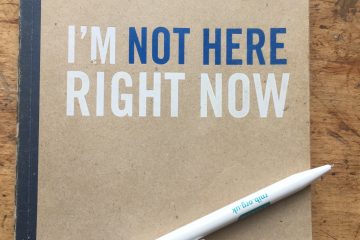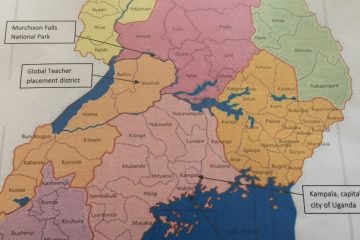![]() I want to tell you a story.
I want to tell you a story.
In Uganda, I was living in a rural village, on my own, with a local family. It was my third day and I was still terrified. I didn’t understand the culture, there was limited communication because of the language barrier and my living circumstances were more challenging than expected. It was Sunday and volunteer teachers had been advised to attend church with their hosts. It turned out that my family weren’t going but I was to be accompanied by 2 children (neither of whom spoke English) for the 3 mile walk to church. This included walking through the dense bush before joining the red murram road. I didn’t want to do it but I couldn’t figure out how to get out of it.
So off we set. There were many people on the road, travelling in both directions. I was nervous and feeling very intimidated. I was in deepest, darkest Africa, on my own with two children, with no idea of where I was going. Every time we met someone, they would stop and stare at me, the muzungu (white person.) It was not a friendly stare and so I tried to avoid eye contact and increase my pace.
This happened repeatedly with my stress levels reaching a peak when I walked past 4 machete-wielding teenagers who were drinking beer at the side of the road. They stopped and glared as I passed.
By the time I reached the church, my heart was pounding out of my chest. All I wanted was a quiet corner at the back where I could go unnoticed until I had calmed down. It was not to be. The priest greeted me with excellent English, welcomed me to the church and insisted on leading me to a special seat. IT WAS ON THE ALTAR. Imagine the shock of the congregation as they entered church to see a muzungu on the altar! Imagine how I felt.
As the mass progressed, I settled down and began to enjoy the service – especially the magnificent singing. I was feeling much better. I should have known. It came to the sermon and I watched as the priest spoke in Runyoro to the congregation then pointed at me. There was a lot of muttering and murmuring. Then he explained.
“I’ve told them that you’re going to deliver the sermon,” he said cheerfully. Don’t worry. I’ll translate for you.” The choice was clear – refuse and cause offence or accept and make a public exhibition of myself. So I stood up and gave a sermon. It was about the differences between Uganda and Scotland and then about what was fundamentally the same. This probably sounds more impressive than it was. As a Head Teacher, I was used to giving assemblies and speaking to large groups of people.
Following the service, as I left the church, I was greeted by the parishioners. Lots of smiles, shaking hands and greetings in Runyoro. I actually felt better and as I made my may home, I had my own Road to Damascus moment. I realised that I couldn’t be scared all the time, I wouldn’t waste my time in Uganda worrying, I would have to take control and be more positive. The next person I met on the road, stopped, stared and glared at me. I took a deep breathe, gave my biggest smile and said, “Oraire ota?” This is the traditional Runyoro greeting and means, “Did you spend the night well?” The response was immediate – smile returned, laughter, hand shaking and then the answer, “ndaire kurungi,” (I spent the night very well.”) All the way home, I took the initiative and had a 100% positive response – even from my machete-wielding, beer drinking teenagers! It was a turning point in my approach to the whole project
So what did I learn? In Africa, many people are wary of strangers (particularly white ones) and wait to see what you will say and do before responding. Every time I lowered my eyes, I was unknowingly being passive aggressive. Even when you are out of your comfort zone, a positive attitude can make the situation better. A smile and a friendly greeting is always appreciated! You hold the key.

Engraving on key says “Fearless!”



2 Comments
Stephen Myerscough · 24th March 2019 at 8:03 am
What a wonderful illustration of positive human communication! A similar approach has served me well in social work, dismantling imaginary barriers. National and international politics could do with more of this…
Margaret Thomson · 25th March 2019 at 4:27 am
Hi Stephen
I couldn’t agree more. so often the barriers lie with us rather than others!